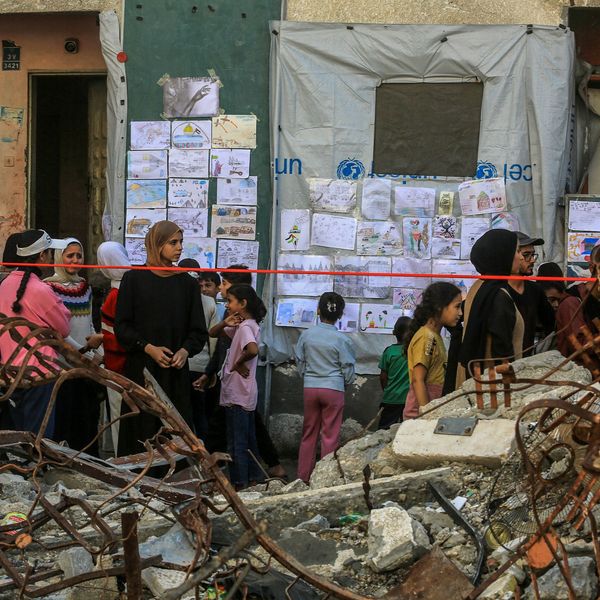Last week, mediators announced an agreement between Israel and Hamas to a cease-fire in the devastating Israel-Gaza War of 2023-2025, which went into effect on Sunday, January 19—the day before Dr. Martin Luther King, Jr. Day and Donald Trump’s inauguration as 47th President of the United States. This agreement will stop warfare for six weeks, lead to the release of dozens of Israeli hostages in Gaza and hundreds of Palestinian political prisoners held in Israel, allow Gazans to return to the remnants of their homes, and let humanitarian aid into Gaza. Importantly, Israeli Prime Minister Benjamin Netanyahu recently warned that the cease-fire is temporary and that the Israel Defense Forces (IDF) would remain in parts of the occupied Gaza Strip. Moreover, after the cease-fire announcement on Wednesday, January 15, the IDF intensified its airstrikes against Gaza, killing at least 120 Palestinians.
Assuming it is adhered to by all parties, a temporary cease-fire will bring some relief to a Gaza Strip devastated by unprecedented levels of Israeli military bombardment, as well as Israeli hostages and Palestinian political prisoners. For the last 15 months since Hamas’ attack of Israel on October 7, 2023 that killed over 1,000 Israelis and took hundreds hostage, Netanyahu’s IDF dropped the equivalent of several Hiroshima-level nuclear bombs on the densely populated Gaza Strip. Around 68% of the IDF’s weaponry came from the U.S. during this time under the Biden-Harris administration, who spent an unprecedented $22.76 billion in arms transfers to Israel during the first year of the war and blocked multiple cease-fire efforts in the United Nations, prolonging what leading human rights organizations have described as a genocidal attack on Gaza.
The American-armed IDF wiped out entire multigenerational lineages of families, orphaned children, bombed hospitals and universities, destroyed ancient mosques and churches, and permanently ended almost 50,000 lives. As an occupying military, the IDF cut off food, water, and electricity to Gaza during this time—creating conditions to bring about population elimination through mass starvation, one of the United Nations’ criteria of genocide.
In the face of the potential dangers associated with Trump’s second presidency, how can concerned Americans advocate for a permanent cease-fire, accountability, and repair in Israel-Palestine?
Therefore, while President Joe Biden ended the very last breaths of his presidency with the beginnings of a temporary cease-fire in Israel-Palestine, his principal legacy in Gaza is one of arming an unchecked genocide for almost a year and a half that wrought mass destruction, death, and irreversible damage upon a vulnerable refugee population mass incarcerated within a 140-square mile strip of land. In the face of Biden’s ineffectiveness in achieving a lasting cease-fire earlier, some are attributing this cease-fire to President Trump’s team, who recently placed pressure on Netanyahu to come to a deal with Hamas. Author and social activist Naomi Klein, however, warns that Netanyahu, who leads a far-right coalition in Israel with religious fundamentalist elements, agreed to a cease-fire as “a kind of welcome gift” for Trump’s inauguration. Trump’s track record and the apocalyptic ideology of his white Christian nationalist base show that we should remain vigilant about the prospects of a second Trump presidency aggravating prospects for permanent peace, justice, and equality in Israel-Palestine.
Indeed, 80% of white American Evangelicals voted for Trump, forming a significant part of his overall coalition. According to religion scholar Bradley Onishi in his 2023 book Preparing for War: The Extremist History of White Christian Nationalism—and What Comes Next, 80% of white American Evangelicals can be classified as white Christian nationalists, or those who believe in a Christian identity of a United States chosen to play an exceptional role in world affairs and that white people deserve to remain at the top of economic, political, and social hierarchies. Owing to their apocalyptic view of the future, white Christian nationalists have been leading voices in the U.S. since World War II in favor of Israel’s dispossession of Palestinians—including during the Israel-Gaza War of 2023-2025.
An October 2024 poll found that 57% of white Evangelicals had confidence in Netanyahu to handle world affairs—even in light of his genocidal assault on the Gaza Strip. The recent sermons of John Hagee—Texas-based white Evangelical pastor, Trump supporter, and founder of Christians United for Israel (CUFI), the leading Christian pro-Israel organization in the U.S. with 10 million members—reveal that Christian fundamentalists perceive the Israel-Gaza War of 2023-2025 as part of a totalizing Battle of Armageddon. According to this worldview, following attacks on Israel during the end of times, a vengeful Judeo-Christian God would wage unrestricted warfare on Israel’s enemies to eliminate them through brute force, secure “the Jewish right to the promised land—all of it,” and permanently foreclose possibilities for a two-state solution. In Hagee’s words, “Jesus Christ, the King of Kings, Lord of Lords, leads his army the church triumphant to annihilate those who have desired to attack Israel.” This warfare would eventually engulf the world, leading to mass violence and suffering—but prior, Christians would be transported to Heaven.
Given his white Christian nationalist base, it should come as no surprise that Trump during his first presidency actively damaged prospects for a two-state solution in Israel-Palestine, recognizing Jerusalem as Israel’s capital and Israeli sovereignty over the Golan Heights. Now that we are about a year and a half into a genocide of the Gaza Strip with a pause for six weeks, concerned Americans must remain vigorously attentive to Trump potentially deteriorating a fragile peace. Animated by his white Christian nationalist base’s call for enabling Netanyahu to finish his ethnic cleansing campaign of the Gaza Strip, Trump might further entrench a Jewish supremacist status quo in Israel-Palestine.
In the face of the potential dangers associated with Trump’s second presidency, how can concerned Americans advocate for a permanent cease-fire, accountability, and repair in Israel-Palestine? We can start by following the lead of Palestinians themselves. Founded in 2005 by over 170 Palestinian civil society organizations, the global, nonviolent Boycott, Divestment, and Sanctions (BDS) Movement calls on institutions and individuals around the world to boycott and withdraw investments from companies that profit from the violation of Palestinian human rights. The BDS Movement aims to pressure Israel into adhering to its obligations to Palestinians under international law: ending its military occupation of Palestinian lands, enshrining equality of Palestinian citizens of Israel into Israeli law, and allowing Palestinians in exile in the diaspora the right to return to their ancestral communities. It is modeled after the global anti-Apartheid movement that, through economic pressure, helped lead South Africa into multiracial democracy.
Healing in Israel-Palestine is realistically going to take a lot of work in the face of Netanyahu’s Biden-enabled genocidal assault on Gaza and a second Trump presidency energized by white Christian nationalism. Even still, we must not allow ourselves to become paralyzed with fear of the daunting tasks ahead. We must play our roles to organize for permanent peace, justice, and equality. As Dr. Martin Luther King Jr. suggested regarding the Vietnam War, “Even when the issues at hand seem as perplexing as they often do in the case of this dreadful conflict,” we must not be “mesmerized by uncertainty”; “we must speak with all the humility that is appropriate to our limited vision, but we must speak.”



